Unit 2 Language前四课时导学案
文档属性
| 名称 | Unit 2 Language前四课时导学案 |
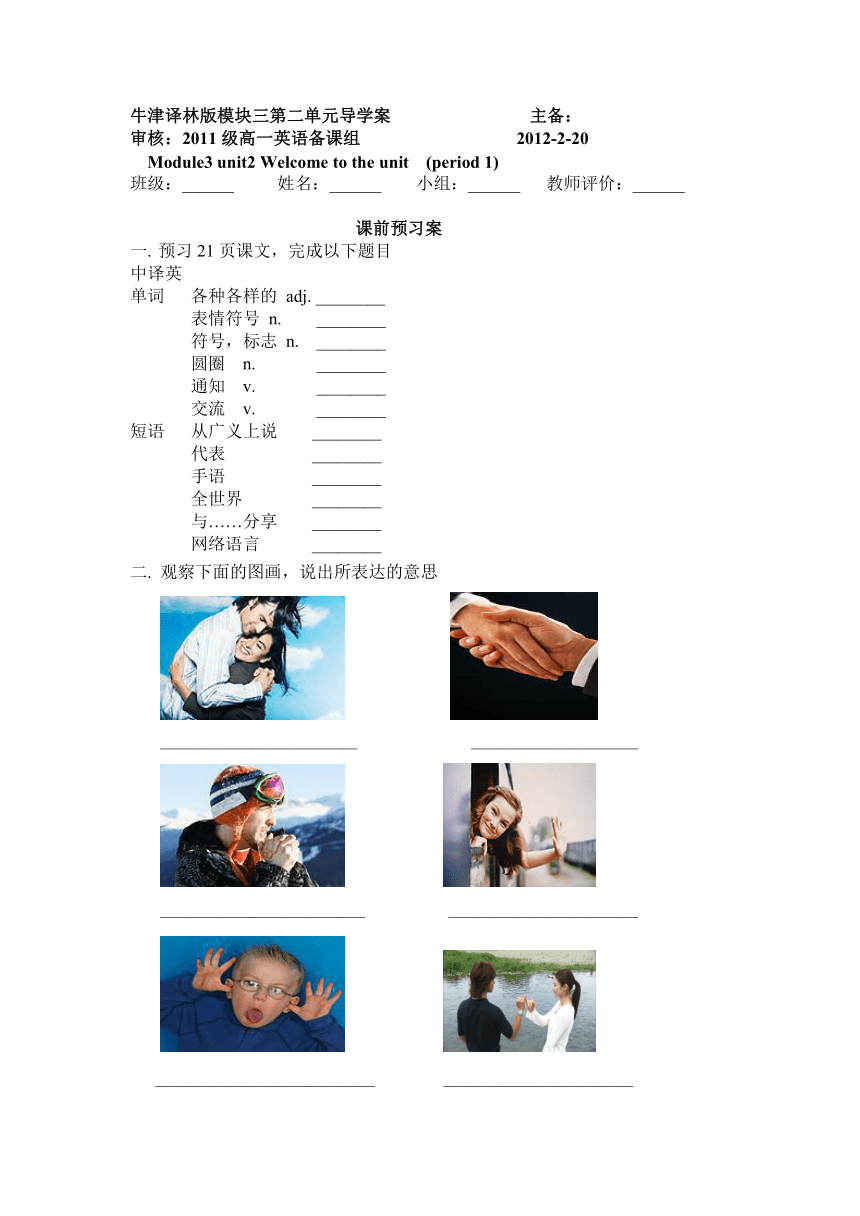
|
|
| 格式 | zip | ||
| 文件大小 | 165.5KB | ||
| 资源类型 | 教案 | ||
| 版本资源 | 牛津译林版 | ||
| 科目 | 英语 | ||
| 更新时间 | 2012-02-23 00:00:00 | ||
图片预览

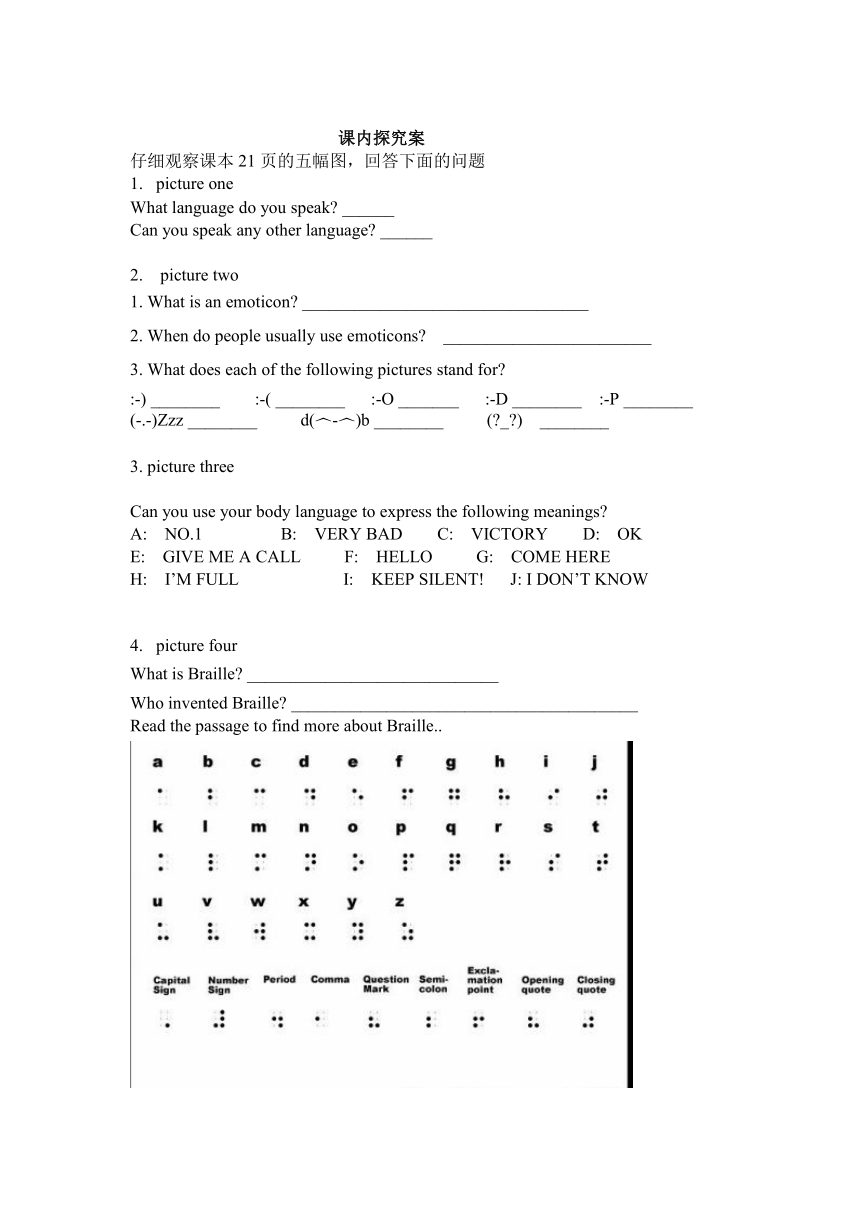
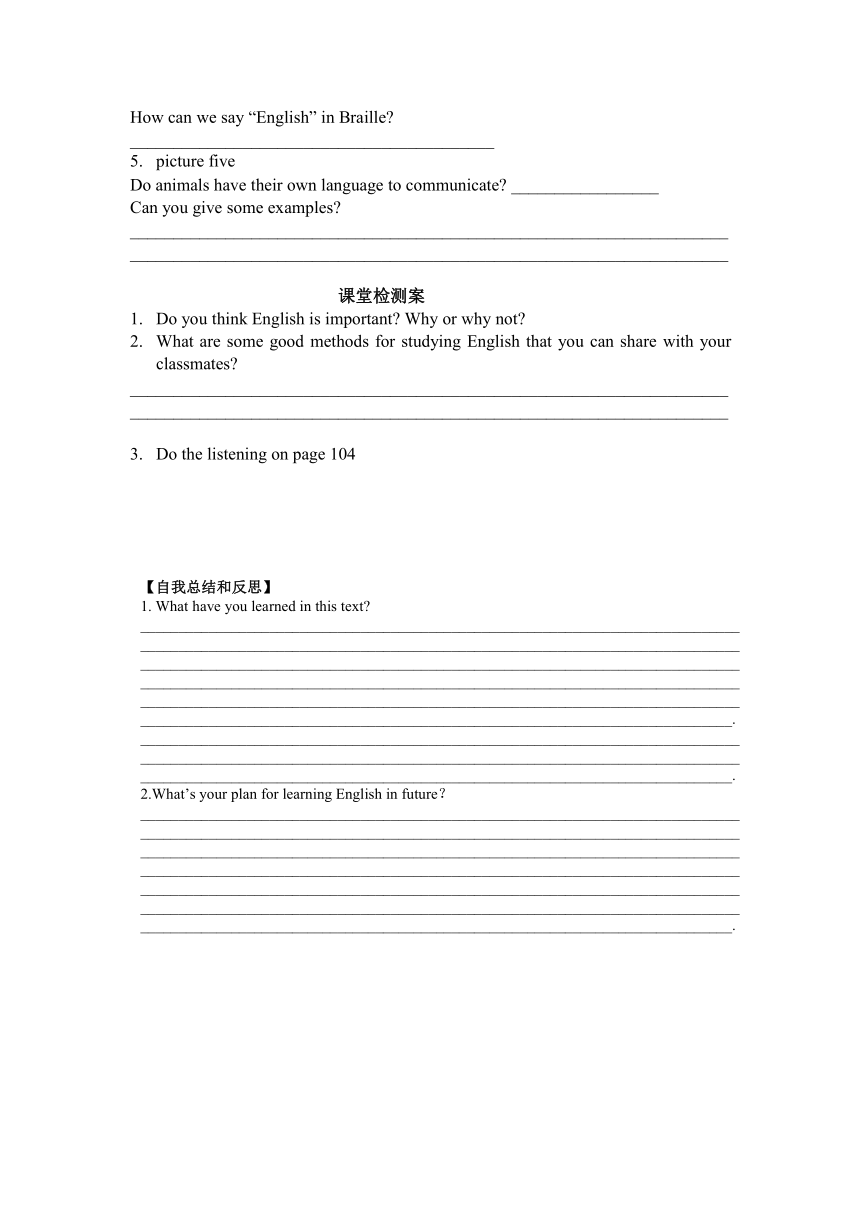
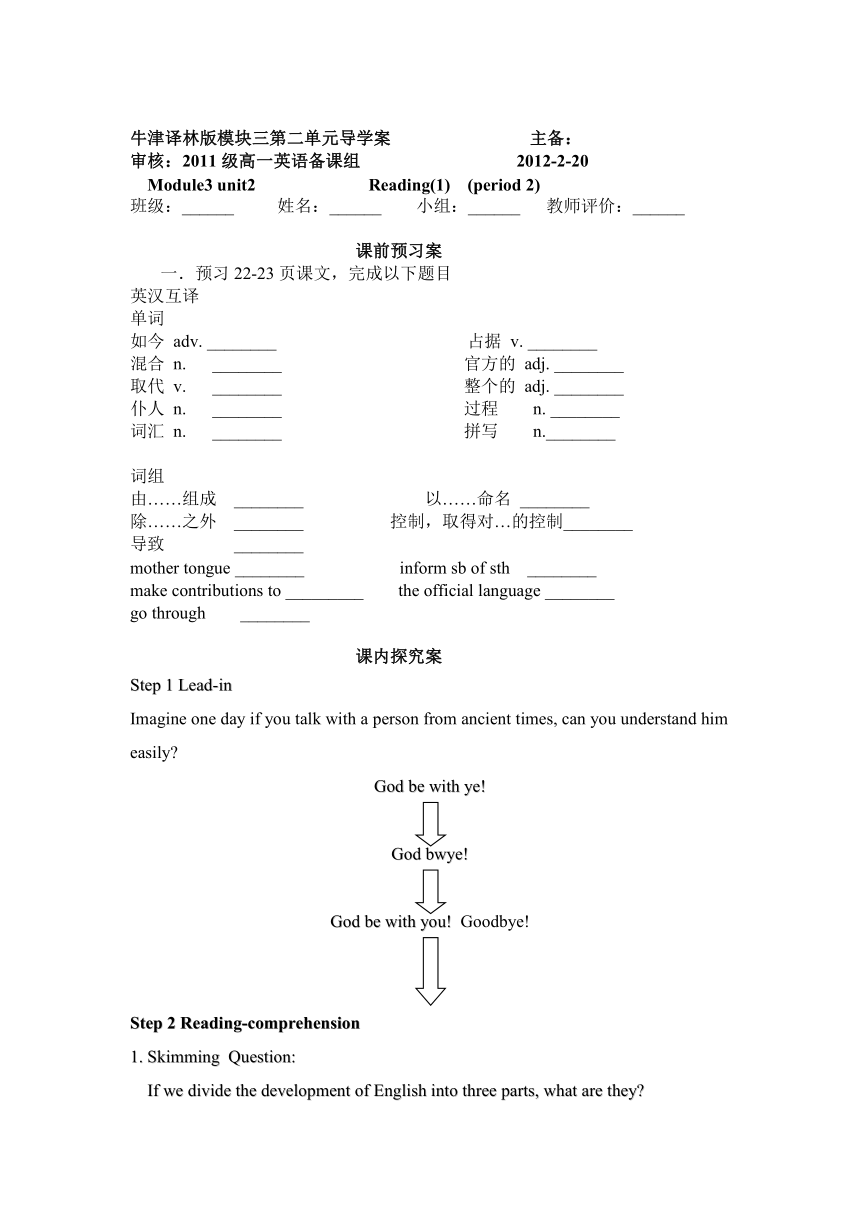
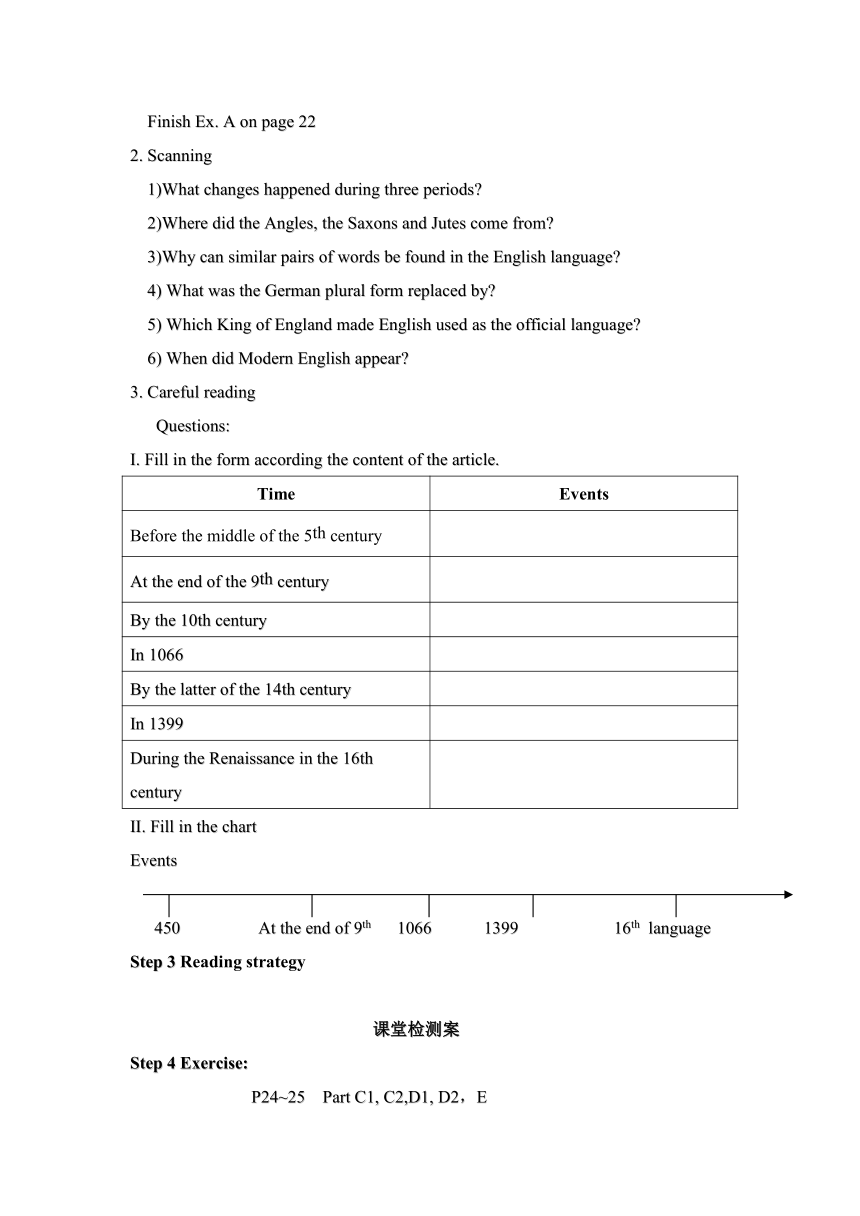
文档简介
牛津译林版模块三第二单元导学案 主备:
审核:2011级高一英语备课组 2012-2-20
Module3 unit2 Welcome to the unit (period 1)
班级:______ 姓名:______ 小组:______ 教师评价:______
课前预习案
预习21页课文,完成以下题目
中译英
单词 各种各样的 adj. ________
表情符号 n. ________
符号,标志 n. ________
圆圈 n. ________
通知 v. ________
交流 v. ________
短语 从广义上说 ________
代表 ________
手语 ________
全世界 ________
与……分享 ________
网络语言 ________
二. 观察下面的图画,说出所表达的意思
__________________________ ______________________
___________________________ _________________________
_____________________________ _________________________
课内探究案
仔细观察课本21页的五幅图,回答下面的问题
picture one
What language do you speak ______
Can you speak any other language ______
2. picture two
1. What is an emoticon _________________________________
2. When do people usually use emoticons ________________________
3. What does each of the following pictures stand for
:-) ________ :-( ________ :-O _______ :-D ________ :-P ________
(-.-)Zzz ________ d(︿-︿)b ________ ( _ ) ________
3. picture three
Can you use your body language to express the following meanings
A: NO.1 B: VERY BAD C: VICTORY D: OK
E: GIVE ME A CALL F: HELLO G: COME HERE
H: I’M FULL I: KEEP SILENT! J: I DON’T KNOW
picture four
What is Braille _____________________________
Who invented Braille ________________________________________
Read the passage to find more about Braille..
How can we say “English” in Braille
__________________________________________
picture five
Do animals have their own language to communicate _________________
Can you give some examples
__________________________________________________________________________________________________________________________________________
课堂检测案
Do you think English is important Why or why not
What are some good methods for studying English that you can share with your classmates
__________________________________________________________________________________________________________________________________________
Do the listening on page 104
【自我总结和反思】
1. What have you learned in this text
_________________________________________________________________________________________________________________________________________________________________________________________________________________________________________________________________________________________________________________________________________________________________________________________________________________________________________________________________________________________.
____________________________________________________________________________________________________________________________________________________________________________________________________________________________________________.
2.What’s your plan for learning English in future?
________________________________________________________________________________________________________________________________________________________________________________________________________________________________________________________________________________________________________________________________________________________________________________________________________________________________________________________________________________________________________________________________________________________________________.
牛津译林版模块三第二单元导学案 主备:
审核:2011级高一英语备课组 2012-2-20
Module3 unit2 Reading(1) (period 2)
班级:______ 姓名:______ 小组:______ 教师评价:______
课前预习案
预习22-23页课文,完成以下题目
英汉互译
单词
如今 adv. ________ 占据 v. ________
混合 n. ________ 官方的 adj. ________
取代 v. ________ 整个的 adj. ________
仆人 n. ________ 过程 n. ________
词汇 n. ________ 拼写 n.________
词组
由……组成 ________ 以……命名 ________
除……之外 ________ 控制,取得对…的控制________
导致 ________
mother tongue ________ inform sb of sth ________
make contributions to _________ the official language ________
go through ________
课内探究案
Step 1 Lead-in
Imagine one day if you talk with a person from ancient times, can you understand him easily
God be with ye!
God bwye!
God be with you!
Goodbye!
Step 2 Reading-comprehension
1. Skimming
Question:
If we divide the development of English into three parts, what are they
Finish Ex. A on page 22
2. Scanning
1)What changes happened during three periods
2)Where did the Angles, the Saxons and Jutes come from
3)Why can similar pairs of words be found in the English language
4) What was the German plural form replaced by
5) Which King of England made English used as the official language
6) When did Modern English appear
3. Careful reading
Questions:
I. Fill in the form according the content of the article.
Time Events
Before the middle of the 5th century
At the end of the 9th century
By the 10th century
In 1066
By the latter of the 14th century
In 1399
During the Renaissance in the 16th century
II. Fill in the chart
Events
450 At the end of 9th 1066 1399 16th
language
Step 3 Reading strategy
课堂检测案
Step 4 Exercise:
P24~25 Part C1, C2,D1, D2,E
P106 A1, A2
Step 5 Consolidation
Activities:
Organize students into groups of four. One is a linguistic expert and the other three are journalists. An expert English linguist will make a brief introduction about the development of the English language.
If time permits, the teacher can select another article for students to practice reading history articles.
【自我总结和反思】
1. What have you learned in this text
_________________________________________________________________________________________________________________________________________________________________________________________________________________________________________________________________________________________________________________________________________________________________________________________________________________________________________________________________________________________.
____________________________________________________________________________________________________________________________________________________________________________________________________________________________________________.
2.What’s your plan for learning English in future?
________________________________________________________________________________________________________________________________________________________________________________________________________________________________________________________________________________________________________________________________________________________________________________________________________________________________________________________________________________________________________________________________________________________________________.
牛津译林版模块三第二单元导学案 主备:
审核:2011级高一英语备课组 2012-2-20
Module3 unit2 reading(2) (period 3)
班级:______ 姓名:______ 小组:______ 教师评价:______
课前预习案
English and its history
Old English In the middle of the 5th century, the language 1.________ in Britain was Celtic. Then Britain was 2.________ by the Angles and the Saxons, who brought their language into Old English.
At the end of the 9th century, the Vikings created Old English, 3._______ their languages with Anglo-Saxon.
By the 10th century, Old English, had become the 4.________ language of English.
Middle English In 1066, England was 5._______ by the Normans, but French didn’t take the 6._____ of English as the first language.
By the latter half of the 14th century, English had been 7.________used among all classes in England.
8.________ English Vocabulary and pronunciation also went 9._________ great changes during the Renaissance. It is 10.________ that English will continue developing in the future.
课内探究案
重点词汇
1. be made up of … 由……组成,可与__________互换
1) The class is made up of 15 girl students and 20 boy students.
= The class__________ 15 girl students and 20 boy students.
班级由15个女生和20个男生组成。
【拓展】:
be made of/be made from/be made out of 由……制成
be made into 被制成
make up 组成,编制,弥补,化妆,和解
make for 走向……;有助于……
make out 理解,辨认出
2) The old building is made of stone.
3) The wine is made from grapes.
4) Her dress is made out of her sister’s old dress.
5) She made the material into a dress.
6) Eleven players make up a football team.
7) Uncle Dick made up an interesting story for the children.
8) We have to drive fast to make up the time we lost in New York.
9) The actors were making up when we arrived.
10) He and his wife usually make up their quarrel the same day.
11) As soon as it started to rain, we made for home.
12) Does early rising make for good health
13) It was difficult to make out his handwriting.
14) I couldn’t make out what he wanted on earth.
2. occupy vt. 占领,占有;使从事,使忙于
1) Enemy troops occupied the country. 敌军占领了这个国家。
2) He was occupied in collecting stamps. 他忙于集邮。
【拓展】
occupy oneself in(with) sth. _____________
3. contribution 贡献,促进作用
contribution n. 可构成词组 make contributions to
1) They made _____ _____ _____ the _____of our ______ .
他们为社会发展做出了巨大的贡献。
【拓展】
contribute捐助;贡献;投稿等,常和to连用
2) We _____ _____ _____ _____ _____ the poor. 我们捐助了食物和衣物救济贫民。
3) He has contributed (articles) to the magazine for several years.
___________________________________________.
4. take control of … 控制,取得对……的控制
1) It's no easy task to take control of a class of young children.
_________________________________________________.
【拓展】
have/hold control of/over 控制着
in control (of) 控制着,出于统治地位
lose control of … ________________
out of control ____________________
under control ____________________
5. lead to 通到;导致
1) 这条路通到旅馆。
_____________________________________________________
2) 抽烟可能导致肺癌。
________________________________________________________
6. replace vt. 替换,代替,取代 相当于词组take the place of。常构成词组replace A with B, 意为用B代替A。
1) Tourism has replaced heavy industry as the city’s main source of income.
= Tourism _____ _____ _____ _____ _____ heavy industry as the city’s main source of income.
旅游业已经取代重工业成为这座城市的主要收入来源。
2) Today many high schools have replaced blackboards with whiteboards.
_______________________________________________.
7. raise vt./ n
The baby was raised on soybean milk. 这孩子是用豆浆喂养大的。
The landlord raised my rent to $200.房东把租金提高到$ 200。
They are going to raise money for the school buildings.他们将为盖校舍筹集资金。
He raised his glass and said: "Your health, Carl."他举起了杯子说道:"祝你健康,卡尔。"
None of them raised any objection.他们谁也没提出反对意见。
True or false:
Prices have been risen up.
The sun raises in the east and sets in the west.
Jack was raised by his aunt after his parents passed away.
重点句型
Even though the Normans spoke French for the entire 250 years they ruled England, French did not replace English as the first language. (P23 L30)
They love each other.
They decide to leave each other.
After the Norman Conquest, high-class people spoke French while common people spoke English. (P23 L46-47)
He likes dancing.
I like listening to music.
3. 把以下课文中的句子用两至三个简单句改写。
People in Britain all spoke a language called Celtic.
__________________________________________
___________________________________________
Middle English is the name given to the English used from around the 12th to the 15th centuries.
________________________________________________
_________________________________________________
__________________________________________________
读以下课文中的句子,判断划线的句子在整个句子中充当的成分。
This is because English has many words and phrases from different languages……
___________________
The question of whether English will keep on changing in the future is easy to answer.
____________________
It is certain that this process will continue, and people will keep inventing new words and new ways of saying things.
____________________
课堂检测案
根据所给首字母写出单词
1 You should read more to enrich your v___________.
2 In July, 2004 China opened its citizens’ tourist travel to many E___________ countries, such as France, Italy, Switzerland, Austria, Germany, Denmark and Norway.
3 Singapore has four o__________ languages: English, Malay, Chinese and Tamil.
4. He planned to find a s__________ to take care of his sick father when he was out..
5 We used to listen to the radio a lot, but n__________ we mostly watch television.
6 The United Kingdom c__________ of Great Britain and Northern Ireland.
7 It now seems c__________ that Pam will lose her license.
【自我总结和反思】
1. What have you learned in this text
_________________________________________________________________________________________________________________________________________________________________________________________________________________________________________________________________________________________________________________________________________________________________________________________________________________________________________________________________________________________.
____________________________________________________________________________________________________________________________________________________________________________________________________________________________________________.
2.What’s your plan for learning English in future?
________________________________________________________________________________________________________________________________________________________________________________________________________________________________________________________________________________________________________________________________________________________________________________________________________________________________________________________________________________________________________________________________________________________________________.
牛津译林版模块三第二单元导学案 主备:
审核:2011级高一英语备课组 2012-2-20
Module3 unit2 word power (period 4)
班级:______ 姓名:______ 小组:______ 教师评价:______
课前预习案
预习课本26-27页的内容,完成以下内容。
Depending on the situation in which the language is used, English can be ___________ or ____________. Formal English is more common in ___________ than in ___________. For example, it is usually found in ____________ and ___________. Informal English is more common in ______________ than in _____________. There are many situations in everyday life where informal English is allowed or even preferred, for example , while ______________ or ___________ at a party.
There are over _________ countries which are members of the United Nations(联合国). _____________ _____________ _____________ _____________ ______________ are permanent(永久的) members of the UN Security Council.(安全理事会)
课内探究案
Step 1. Lead in
①An informal letter:
Dear Mr. Lee,
I am so sorry that I cannot come to the dinner you and Mrs. Lee are giving next Saturday for your brother because of a previous engagement that evening.
I do appreciate your asking me and hope that I will have the opportunity to meet your brother on some other occasion in the near future.
②同学们判断一下,下面哪种表达更好呢?
1.(To a professor you first meet)
----- Hi, Bob. Fancy meeting you here.
----- Good morning , Mr. Mosley. How are you
2. (To a close friend)
----- Mr. Wells, would you be kind enough to pass me the salt
----- Could you possibly pass me the salt?
----- Pass me the salt, Jack .
③ 下面这个句子你认为那些地方用到了非正式用语呢?
I am sorry to say that a lot of your answers to those questions in your homework are not precise, so you must think about them.
Then ask students to present some other examples.
Formal and informal English(完成下面这个表格)
Formal English Informal English
a large amount/number of _______________________
_________________ Look up to
child ______________
_______________ handle
I regret to inform you… _________________
_________________ right away
satisfy __________________
______________________- hard
prevent _______________________
______________________ Speak to you about
reply _______________________
_________________________ Like you to do
Take… into consideration ______________________
Step 2 Presentation
1.Ask students to read the introductions to formal and informal English .(填空)
________________ is more common in writing, while ________________is more common in speaking.
Step 3 Practice
Ask students to practice what they have learnt above. First point out the informal places while they are reading the letter.
Then rewrite the letter in formal English.
Dear Mr. Smith,
I want to ______you about the condition of the playground. People are throwing garbage everywhere. They leave garbage on the ground instead of using the garbage cans. This is a danger to _______. Yesterday a 6-year-old kid fell and cut his hand on a broken bottle. The boy was taken to hospital. Also, the garbage makes the playground look dirty, and no one wants to go there.
I would _____________________ handle this problem ____________. For example, you should buy more garbage cans and __________ people from littering.
Please _____________ my suggestions. I am _____________ your ___________.
Best regards
Step 4. Countries and languages.
1. How many languages are spoken in the world today _____________
2. Do you know the ten most widely spoken languages What are they
____________________________________________________________
_____________________________________________________________
Look at your books and fill in the form.
Country Official language(s) Country Official language(s)
Australia English Mexico ___________
Bengal Bengali New Zealand English, Maori
Canada _________ Portugal Portuguese
Chinese Chinese Russia __________
Egypt Arabic Saudi Arabia Arabic
France ________ Singapore English, Chinese, Malay, Tamil
Germany __________ Spain __________
India English, Hindi Switzerland French, German, Italian
Ireland English, Irish U. k ___________
Italy Italian USA English
.Then have students finish Part A and share their answers with their group members.
课堂检测案
Step 5. Exercise:
单词拼写
1. He failed in the English exam, mainly because he has a poor v______.
2. Canada has two o_____ languages: English and French.
3. I knew the town well, so I had no d______ finding his home.
4. For westerners, Chinese c_______ are hard to write.
5. For students, their future d_______ on how well they do in the entrance exams.
6. The war has lasted for years. It will take quite a long time for the government to bring the country under _____(控制).
7. Do you know why water cannot be _____(混合) with oil.
8. With the _____(发展)of science and technology, it is not too difficult for human beings to go and travel in space.
9.Now traveling in five _______(欧洲的) countries, including France, Germany, Austria, Vatican and Italy, in 10 days costs one about 14,000 yuan.
10. He ______(答应,许诺) to be here at nine o’clock.
11. He worked so hard that ______(最后) he made himself ill.
12. The woman turned and walked off in the ______(相反的) direction.
【自我总结和反思】
1. What have you learned in this text
_________________________________________________________________________________________________________________________________________________________________________________________________________________________________________________________________________________________________________________________________________________________________________________________________________________________________________________________________________________________
2.What’s your plan for learning English in future?
_________________________________________________________________________________________________________________________________________________________________________________________________________________________________________________________________________________________________________________________________________________________________________________________________________________________________________________________________________________________
审核:2011级高一英语备课组 2012-2-20
Module3 unit2 Welcome to the unit (period 1)
班级:______ 姓名:______ 小组:______ 教师评价:______
课前预习案
预习21页课文,完成以下题目
中译英
单词 各种各样的 adj. ________
表情符号 n. ________
符号,标志 n. ________
圆圈 n. ________
通知 v. ________
交流 v. ________
短语 从广义上说 ________
代表 ________
手语 ________
全世界 ________
与……分享 ________
网络语言 ________
二. 观察下面的图画,说出所表达的意思
__________________________ ______________________
___________________________ _________________________
_____________________________ _________________________
课内探究案
仔细观察课本21页的五幅图,回答下面的问题
picture one
What language do you speak ______
Can you speak any other language ______
2. picture two
1. What is an emoticon _________________________________
2. When do people usually use emoticons ________________________
3. What does each of the following pictures stand for
:-) ________ :-( ________ :-O _______ :-D ________ :-P ________
(-.-)Zzz ________ d(︿-︿)b ________ ( _ ) ________
3. picture three
Can you use your body language to express the following meanings
A: NO.1 B: VERY BAD C: VICTORY D: OK
E: GIVE ME A CALL F: HELLO G: COME HERE
H: I’M FULL I: KEEP SILENT! J: I DON’T KNOW
picture four
What is Braille _____________________________
Who invented Braille ________________________________________
Read the passage to find more about Braille..
How can we say “English” in Braille
__________________________________________
picture five
Do animals have their own language to communicate _________________
Can you give some examples
__________________________________________________________________________________________________________________________________________
课堂检测案
Do you think English is important Why or why not
What are some good methods for studying English that you can share with your classmates
__________________________________________________________________________________________________________________________________________
Do the listening on page 104
【自我总结和反思】
1. What have you learned in this text
_________________________________________________________________________________________________________________________________________________________________________________________________________________________________________________________________________________________________________________________________________________________________________________________________________________________________________________________________________________________.
____________________________________________________________________________________________________________________________________________________________________________________________________________________________________________.
2.What’s your plan for learning English in future?
________________________________________________________________________________________________________________________________________________________________________________________________________________________________________________________________________________________________________________________________________________________________________________________________________________________________________________________________________________________________________________________________________________________________________.
牛津译林版模块三第二单元导学案 主备:
审核:2011级高一英语备课组 2012-2-20
Module3 unit2 Reading(1) (period 2)
班级:______ 姓名:______ 小组:______ 教师评价:______
课前预习案
预习22-23页课文,完成以下题目
英汉互译
单词
如今 adv. ________ 占据 v. ________
混合 n. ________ 官方的 adj. ________
取代 v. ________ 整个的 adj. ________
仆人 n. ________ 过程 n. ________
词汇 n. ________ 拼写 n.________
词组
由……组成 ________ 以……命名 ________
除……之外 ________ 控制,取得对…的控制________
导致 ________
mother tongue ________ inform sb of sth ________
make contributions to _________ the official language ________
go through ________
课内探究案
Step 1 Lead-in
Imagine one day if you talk with a person from ancient times, can you understand him easily
God be with ye!
God bwye!
God be with you!
Goodbye!
Step 2 Reading-comprehension
1. Skimming
Question:
If we divide the development of English into three parts, what are they
Finish Ex. A on page 22
2. Scanning
1)What changes happened during three periods
2)Where did the Angles, the Saxons and Jutes come from
3)Why can similar pairs of words be found in the English language
4) What was the German plural form replaced by
5) Which King of England made English used as the official language
6) When did Modern English appear
3. Careful reading
Questions:
I. Fill in the form according the content of the article.
Time Events
Before the middle of the 5th century
At the end of the 9th century
By the 10th century
In 1066
By the latter of the 14th century
In 1399
During the Renaissance in the 16th century
II. Fill in the chart
Events
450 At the end of 9th 1066 1399 16th
language
Step 3 Reading strategy
课堂检测案
Step 4 Exercise:
P24~25 Part C1, C2,D1, D2,E
P106 A1, A2
Step 5 Consolidation
Activities:
Organize students into groups of four. One is a linguistic expert and the other three are journalists. An expert English linguist will make a brief introduction about the development of the English language.
If time permits, the teacher can select another article for students to practice reading history articles.
【自我总结和反思】
1. What have you learned in this text
_________________________________________________________________________________________________________________________________________________________________________________________________________________________________________________________________________________________________________________________________________________________________________________________________________________________________________________________________________________________.
____________________________________________________________________________________________________________________________________________________________________________________________________________________________________________.
2.What’s your plan for learning English in future?
________________________________________________________________________________________________________________________________________________________________________________________________________________________________________________________________________________________________________________________________________________________________________________________________________________________________________________________________________________________________________________________________________________________________________.
牛津译林版模块三第二单元导学案 主备:
审核:2011级高一英语备课组 2012-2-20
Module3 unit2 reading(2) (period 3)
班级:______ 姓名:______ 小组:______ 教师评价:______
课前预习案
English and its history
Old English In the middle of the 5th century, the language 1.________ in Britain was Celtic. Then Britain was 2.________ by the Angles and the Saxons, who brought their language into Old English.
At the end of the 9th century, the Vikings created Old English, 3._______ their languages with Anglo-Saxon.
By the 10th century, Old English, had become the 4.________ language of English.
Middle English In 1066, England was 5._______ by the Normans, but French didn’t take the 6._____ of English as the first language.
By the latter half of the 14th century, English had been 7.________used among all classes in England.
8.________ English Vocabulary and pronunciation also went 9._________ great changes during the Renaissance. It is 10.________ that English will continue developing in the future.
课内探究案
重点词汇
1. be made up of … 由……组成,可与__________互换
1) The class is made up of 15 girl students and 20 boy students.
= The class__________ 15 girl students and 20 boy students.
班级由15个女生和20个男生组成。
【拓展】:
be made of/be made from/be made out of 由……制成
be made into 被制成
make up 组成,编制,弥补,化妆,和解
make for 走向……;有助于……
make out 理解,辨认出
2) The old building is made of stone.
3) The wine is made from grapes.
4) Her dress is made out of her sister’s old dress.
5) She made the material into a dress.
6) Eleven players make up a football team.
7) Uncle Dick made up an interesting story for the children.
8) We have to drive fast to make up the time we lost in New York.
9) The actors were making up when we arrived.
10) He and his wife usually make up their quarrel the same day.
11) As soon as it started to rain, we made for home.
12) Does early rising make for good health
13) It was difficult to make out his handwriting.
14) I couldn’t make out what he wanted on earth.
2. occupy vt. 占领,占有;使从事,使忙于
1) Enemy troops occupied the country. 敌军占领了这个国家。
2) He was occupied in collecting stamps. 他忙于集邮。
【拓展】
occupy oneself in(with) sth. _____________
3. contribution 贡献,促进作用
contribution n. 可构成词组 make contributions to
1) They made _____ _____ _____ the _____of our ______ .
他们为社会发展做出了巨大的贡献。
【拓展】
contribute捐助;贡献;投稿等,常和to连用
2) We _____ _____ _____ _____ _____ the poor. 我们捐助了食物和衣物救济贫民。
3) He has contributed (articles) to the magazine for several years.
___________________________________________.
4. take control of … 控制,取得对……的控制
1) It's no easy task to take control of a class of young children.
_________________________________________________.
【拓展】
have/hold control of/over 控制着
in control (of) 控制着,出于统治地位
lose control of … ________________
out of control ____________________
under control ____________________
5. lead to 通到;导致
1) 这条路通到旅馆。
_____________________________________________________
2) 抽烟可能导致肺癌。
________________________________________________________
6. replace vt. 替换,代替,取代 相当于词组take the place of。常构成词组replace A with B, 意为用B代替A。
1) Tourism has replaced heavy industry as the city’s main source of income.
= Tourism _____ _____ _____ _____ _____ heavy industry as the city’s main source of income.
旅游业已经取代重工业成为这座城市的主要收入来源。
2) Today many high schools have replaced blackboards with whiteboards.
_______________________________________________.
7. raise vt./ n
The baby was raised on soybean milk. 这孩子是用豆浆喂养大的。
The landlord raised my rent to $200.房东把租金提高到$ 200。
They are going to raise money for the school buildings.他们将为盖校舍筹集资金。
He raised his glass and said: "Your health, Carl."他举起了杯子说道:"祝你健康,卡尔。"
None of them raised any objection.他们谁也没提出反对意见。
True or false:
Prices have been risen up.
The sun raises in the east and sets in the west.
Jack was raised by his aunt after his parents passed away.
重点句型
Even though the Normans spoke French for the entire 250 years they ruled England, French did not replace English as the first language. (P23 L30)
They love each other.
They decide to leave each other.
After the Norman Conquest, high-class people spoke French while common people spoke English. (P23 L46-47)
He likes dancing.
I like listening to music.
3. 把以下课文中的句子用两至三个简单句改写。
People in Britain all spoke a language called Celtic.
__________________________________________
___________________________________________
Middle English is the name given to the English used from around the 12th to the 15th centuries.
________________________________________________
_________________________________________________
__________________________________________________
读以下课文中的句子,判断划线的句子在整个句子中充当的成分。
This is because English has many words and phrases from different languages……
___________________
The question of whether English will keep on changing in the future is easy to answer.
____________________
It is certain that this process will continue, and people will keep inventing new words and new ways of saying things.
____________________
课堂检测案
根据所给首字母写出单词
1 You should read more to enrich your v___________.
2 In July, 2004 China opened its citizens’ tourist travel to many E___________ countries, such as France, Italy, Switzerland, Austria, Germany, Denmark and Norway.
3 Singapore has four o__________ languages: English, Malay, Chinese and Tamil.
4. He planned to find a s__________ to take care of his sick father when he was out..
5 We used to listen to the radio a lot, but n__________ we mostly watch television.
6 The United Kingdom c__________ of Great Britain and Northern Ireland.
7 It now seems c__________ that Pam will lose her license.
【自我总结和反思】
1. What have you learned in this text
_________________________________________________________________________________________________________________________________________________________________________________________________________________________________________________________________________________________________________________________________________________________________________________________________________________________________________________________________________________________.
____________________________________________________________________________________________________________________________________________________________________________________________________________________________________________.
2.What’s your plan for learning English in future?
________________________________________________________________________________________________________________________________________________________________________________________________________________________________________________________________________________________________________________________________________________________________________________________________________________________________________________________________________________________________________________________________________________________________________.
牛津译林版模块三第二单元导学案 主备:
审核:2011级高一英语备课组 2012-2-20
Module3 unit2 word power (period 4)
班级:______ 姓名:______ 小组:______ 教师评价:______
课前预习案
预习课本26-27页的内容,完成以下内容。
Depending on the situation in which the language is used, English can be ___________ or ____________. Formal English is more common in ___________ than in ___________. For example, it is usually found in ____________ and ___________. Informal English is more common in ______________ than in _____________. There are many situations in everyday life where informal English is allowed or even preferred, for example , while ______________ or ___________ at a party.
There are over _________ countries which are members of the United Nations(联合国). _____________ _____________ _____________ _____________ ______________ are permanent(永久的) members of the UN Security Council.(安全理事会)
课内探究案
Step 1. Lead in
①An informal letter:
Dear Mr. Lee,
I am so sorry that I cannot come to the dinner you and Mrs. Lee are giving next Saturday for your brother because of a previous engagement that evening.
I do appreciate your asking me and hope that I will have the opportunity to meet your brother on some other occasion in the near future.
②同学们判断一下,下面哪种表达更好呢?
1.(To a professor you first meet)
----- Hi, Bob. Fancy meeting you here.
----- Good morning , Mr. Mosley. How are you
2. (To a close friend)
----- Mr. Wells, would you be kind enough to pass me the salt
----- Could you possibly pass me the salt?
----- Pass me the salt, Jack .
③ 下面这个句子你认为那些地方用到了非正式用语呢?
I am sorry to say that a lot of your answers to those questions in your homework are not precise, so you must think about them.
Then ask students to present some other examples.
Formal and informal English(完成下面这个表格)
Formal English Informal English
a large amount/number of _______________________
_________________ Look up to
child ______________
_______________ handle
I regret to inform you… _________________
_________________ right away
satisfy __________________
______________________- hard
prevent _______________________
______________________ Speak to you about
reply _______________________
_________________________ Like you to do
Take… into consideration ______________________
Step 2 Presentation
1.Ask students to read the introductions to formal and informal English .(填空)
________________ is more common in writing, while ________________is more common in speaking.
Step 3 Practice
Ask students to practice what they have learnt above. First point out the informal places while they are reading the letter.
Then rewrite the letter in formal English.
Dear Mr. Smith,
I want to ______you about the condition of the playground. People are throwing garbage everywhere. They leave garbage on the ground instead of using the garbage cans. This is a danger to _______. Yesterday a 6-year-old kid fell and cut his hand on a broken bottle. The boy was taken to hospital. Also, the garbage makes the playground look dirty, and no one wants to go there.
I would _____________________ handle this problem ____________. For example, you should buy more garbage cans and __________ people from littering.
Please _____________ my suggestions. I am _____________ your ___________.
Best regards
Step 4. Countries and languages.
1. How many languages are spoken in the world today _____________
2. Do you know the ten most widely spoken languages What are they
____________________________________________________________
_____________________________________________________________
Look at your books and fill in the form.
Country Official language(s) Country Official language(s)
Australia English Mexico ___________
Bengal Bengali New Zealand English, Maori
Canada _________ Portugal Portuguese
Chinese Chinese Russia __________
Egypt Arabic Saudi Arabia Arabic
France ________ Singapore English, Chinese, Malay, Tamil
Germany __________ Spain __________
India English, Hindi Switzerland French, German, Italian
Ireland English, Irish U. k ___________
Italy Italian USA English
.Then have students finish Part A and share their answers with their group members.
课堂检测案
Step 5. Exercise:
单词拼写
1. He failed in the English exam, mainly because he has a poor v______.
2. Canada has two o_____ languages: English and French.
3. I knew the town well, so I had no d______ finding his home.
4. For westerners, Chinese c_______ are hard to write.
5. For students, their future d_______ on how well they do in the entrance exams.
6. The war has lasted for years. It will take quite a long time for the government to bring the country under _____(控制).
7. Do you know why water cannot be _____(混合) with oil.
8. With the _____(发展)of science and technology, it is not too difficult for human beings to go and travel in space.
9.Now traveling in five _______(欧洲的) countries, including France, Germany, Austria, Vatican and Italy, in 10 days costs one about 14,000 yuan.
10. He ______(答应,许诺) to be here at nine o’clock.
11. He worked so hard that ______(最后) he made himself ill.
12. The woman turned and walked off in the ______(相反的) direction.
【自我总结和反思】
1. What have you learned in this text
_________________________________________________________________________________________________________________________________________________________________________________________________________________________________________________________________________________________________________________________________________________________________________________________________________________________________________________________________________________________
2.What’s your plan for learning English in future?
_________________________________________________________________________________________________________________________________________________________________________________________________________________________________________________________________________________________________________________________________________________________________________________________________________________________________________________________________________________________
